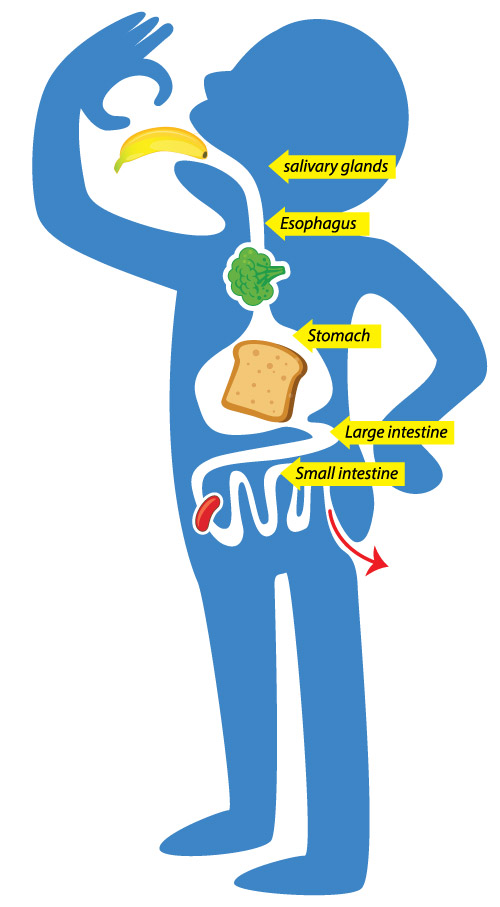Your child’s digestive system is similar to a processing plant – its main function is to convert food into energy and the nutrients his body needs. The entire process of digestion starts right in his mouth (his saliva starts the digestive process off), and this process will continue as the food/drink passes through his digestive organs (e.g. his stomach, small intestines, and large intestines). By the time this process is completed, his body will eliminate the remainder in the form of urine or stools.
Your child’s digestive system is primarily focused on the task of processing any food or drink that he eats or drinks. Depending on what was consumed, this process can take several hours. His body will extract the nutrients and energy that he needs from the food/drink.
More than meets the eye
However, it should be noted that his digestive system also performs other important tasks, the most notable of which is its role as part of his immune system. After all, the first point of entry for any kind of pathogen (bacteria or virus that causes illness) is usually through the digestive system. By ensuring that his gut is healthy, his digestive system will neutralise these pathogens, thus preventing any illnesses that they may cause.
That’s not all! New evidence is emerging that sheds light on how your gut microbiota (micro-organism including bacterial composition) does more than just help your digestion. They will determine how your body stores fat or balances your blood-glucose levels, and also how it responds to the appetite-regulating hormones.
In fact, the digestive system has more tricks up its sleeve. New research shows that the digestive system contains a lot of neurotransmitters, leading to it being called the ‘second brain’ by researchers. In addition, these neurotransmitters in your child’s gut also work in conjunction with hormones to help regulate his appetite. These are the hormones ghrelin (increases your appetite) and leptin (decreases your appetite).
It doesn’t stop there. Preliminary findings from new research have also found new links between the gut microbiota (the internal balance of bacteria within the gut) and obesity, Type 2 Diabetes, inflammatory bowel disease, Crohn’s disease, and even the modulation of brain development and behaviour.
It’s all about Balance
Research has shown that obesity and allergies can be linked to an abnormal gut microbiota balance. When such an imbalance happens, it can result in the body storing excessive fat (leading to obesity), or pave the way for allergic diseases to occur. After all, a healthy digestive system requires a wellbalanced gut microbiome to prevent infectious, inflammatory, and allergic diseases from affecting us.
Unseen helpers
An invisible and often neglected aspect of digestive health is the composition of good bacteria that make up your child’s gut microbiota. A healthy gut microbiota composition affects the well-being of the child as it is well-established that disturbances of the gut microbiota is associated with development of various disorders including metabolic, immune system and even psychological and behavioural problems.
In addition to eating a diet that is rich in fruits and vegetables, taking food that is rich in prebiotics and probiotics can also help to favour a healthier gut microbiota composition.
Did you Know?
Prebiotics are the food for good bacteria
It can be found in high-fibre foods such as banana, garlic, onions, shallots, leeks, asparagus, and whole grains. These foods contain indigestible plant fibres which aid the growth of ‘good’ bacteria.
Probiotics are the ‘good’ bacteria itself
These microorganisms can be found in foods such as fermented milk products, fermented soy products, and supplements. Nowadays, some manufacturers also add probiotics and prebiotics to their products. Note: If your child has a serious or chronic illness, kindly seek your paediatrician’s advice before you give him any probiotics.
Caring for His Digestive System
This information certainly puts the entire digestive system in a whole new light and taking better care of it is becoming more and more crucial. As parents, you should ensure that your child’s digestive system continues to work properly by making sure that he drinks enough water, eats a healthy diet that includes foods rich in fibre every day, and gets at least an hour of daily exercise. This can consist of indoor/outdoor activities such as football or badminton.
You can also turn it into a fun way to spend quality family time together if the entire family indulges in physical activities during weekends. Remember to limit the time your child spends on sedentary activities (e.g. time spent on non-physical activities such as computer games, or television).






Comments